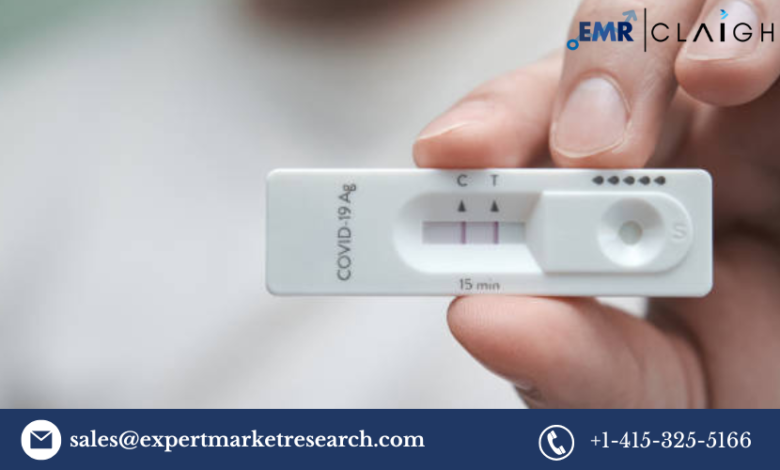United States Patient At-Home Testing Kits Market: Growth, Trends, and Key Players 2032

The United States patient at-home testing kits market is experiencing rapid growth, with a projected CAGR of 7.94% from 2024 to 2032. This expansion is fueled by the increasing prevalence of infectious diseases and chronic conditions, as well as rising consumer awareness about the benefits of self-testing kits. These diagnostic kits provide a convenient and effective way to monitor health at home, reducing the need for in-person visits to healthcare facilities.
1. Market Drivers and Growth Factors
The patient at-home testing kits market in the United States is driven by several factors:
- Increasing Prevalence of Infectious Diseases: The demand for at-home test kits surged during the COVID-19 pandemic, and this trend continues as new health concerns emerge. These kits allow individuals to safely monitor their health from the comfort of their homes.
- Rising Health Awareness: People are more proactive about their health, seeking self-testing solutions for early disease detection and management of chronic conditions like diabetes and hypertension.
- Advancements in Diagnostic Technology: Technological improvements have led to more accurate, easy-to-use, and affordable at-home diagnostics kits, catering to a wide range of health conditions.
- Telehealth and Remote Monitoring: The growth of telemedicine has also boosted the adoption of home-based diagnostic kits, allowing for seamless integration with remote healthcare services.
2. Emerging Trends in At-Home Testing Kits Market
- Digital Health Integration: Many home testing kits now come with digital platforms or mobile apps that help users manage their health data and share it with healthcare providers. This trend is making at-home diagnostics more accessible and comprehensive.
- Diverse Range of Testing Options: Initially focused on infectious diseases, the market has expanded to include home test kits for wellness, lifestyle, and genetic testing.
- AI and Machine Learning: Artificial intelligence is increasingly being used to analyze test results, providing users with instant feedback and personalized insights. AI-enabled at-home testing kits are enhancing diagnostic accuracy and making it easier for users to interpret their results.
- Increased Investment in Innovation: The United States at-home diagnostics market has attracted significant investment, with companies developing new products and solutions to meet rising consumer demand.
3. Competitor Landscape in the United States At-Home Testing Kits Market
Key players in the U.S. patient at-home testing kits market include:
- Lucira Health Inc.: Known for its rapid molecular testing technology.
- Essenlix Corporation: Focuses on developing compact, smartphone-enabled at-home diagnostics.
- Abbott Laboratories, Inc.: A leader in self-testing kits, with a broad range of products for various health conditions.
- Roche Diagnostics Corporation: Offers reliable home test kits with digital connectivity.
- Thermo Fisher Scientific, Inc.: Provides advanced at-home testing solutions for disease detection and health monitoring.
This section should also touch on strategic moves like mergers, acquisitions, and partnerships among key players to strengthen their positions in the market.
4. Opportunities and Challenges in the United States At-Home Testing Kits Market
- Opportunities:
- Expanding Applications for At-Home Diagnostics: There is significant potential for home-based diagnostic kits in areas like genetic testing, lifestyle assessments, and chronic disease management.
- IoT Integration for Remote Health Monitoring: By integrating home diagnostic kits with IoT devices, users can obtain a more complete picture of their health and monitor it remotely.
- Challenges:
- Navigating Regulatory Compliance: As self-testing kits advance, maintaining compliance with FDA regulations is essential. Companies must continually validate the accuracy and safety of their home diagnostics.
- Data Privacy Concerns: With more app-connected test kits entering the market, ensuring data security is crucial. Consumers want to know their health information is protected.
5. Future Outlook for the United States Patient At-Home Testing Kits Market
The patient at-home testing kits market in the United States is poised for continued growth as consumer demand for home-based health monitoring solutions rises. By 2032, it is likely that self-testing kits will become a standard aspect of personal health management. Advances in AI, IoT, and digital health will continue to shape the future of at-home diagnostics, offering new and innovative solutions for personalized healthcare.
Frequently Asked Questions (FAQs)
- How reliable are at-home testing kits?
Most self-testing kits are highly accurate when used correctly, especially those approved by the FDA. - What types of at-home diagnostic tests are available?
There are home-based diagnostic kits for infectious diseases, chronic conditions, lifestyle testing, and even genetic testing. - Are at-home testing kits safe to use?
Yes, FDA-approved self-testing kits are designed to be safe and user-friendly. Always follow the instructions provided with each kit. - How is my health data protected?
Many companies prioritize data security, complying with HIPAA and other regulations to ensure self-testing kit users’ information is safeguarded.





